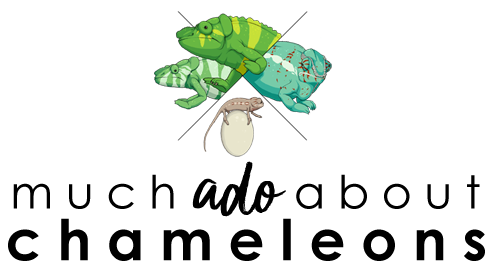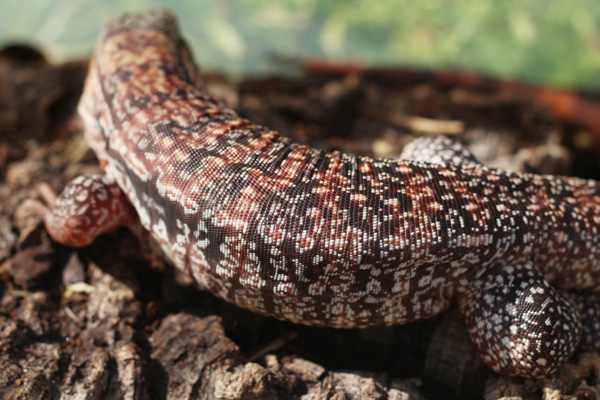If you saw last week’s blog post you might be a slightly
horrified right now. A little like when we watch Monsters Inside Me and vow to never eat anything even remotely
containing pork in a sketchy south-east Asian rural food stand. Easy enough; don’t
order Yam naem sot while driving
through the backwoods of Thailand. The bad news, however, is that it’s not as
straight-forward to avoid parasitic infections in our herps. How do we
keep the same thing that happened to Fox the panther chameleon from
happening to other reptiles in our homes?
Parasites are everywhere, unfortunately. If you’ve spent any
time on reptile groups or forums then inevitably you’ve heard that feeding
wild-caught bugs (like grasshoppers, crickets, mantids, etc. from outside)
carry a high risk of infecting your pet with parasites. This is true. However,
this does not, contrary to popular misconception,
mean that if your pets only eat captive farmed insects like crickets and
superworms, that they will never catch any parasites. A biologist I knew, Pete
Bandre (owner of Incredible Pets in Melbourne, Florida for a good two decades),
told me once about an informal study he did once. He wanted to see if any
cricket suppliers had “cleaner” crickets than others, so he ordered a bulk box
from all the top suppliers in the US. He had each supplier’s stock sampled and
they all came back positive for things like pinwom and even coccidia. Yikes!
Ok, so if even our innocent pet store crickets are riddled
with the potential for parasites, the only things we can do are mitigate risk,
do preventive testing and treatment, and treat parasite loads as necessary.
Keeping Parasites from Taking Over
The truth of the matter is that parasites are everywhere. According
to the CDC, millions of people carry some sort of parasite, and many are
totally unaware. That’s the thing about parasites; it’s not in their best
interest to kill the hosts they live in, and our immune systems keep them in
check to a degree, so in most cases the host will never know they have parasites
until their immune system is compromised somehow and the parasites get too
prolific or they find themselves in an area of the body where they cause problems.
If everything stays in balance a person or a chameleon could live full and
healthy lives never knowing that they have worms or other parasites in their
system.
What does that mean for us? That parasites are not an
instant death sentence, thankfully, just something to manage. All the common parasites in chameleons are also easily treatable with the help of a veterinarian, In no particular
order:
1. Keep insect colonies as clean as possible.
Clearly, our insects are coming in with all sorts of
potential invaders, so to keep it from getting out of control I recommend
keeping cricket and other insect colonies as clean and dry as possible. I had
one chameleon test positive for E-coli in his saliva once from his food, so even though it’s
not a parasite, keeping the insects from living in and around their own feces
will help keep things more sanitary in general. From the anecdote I told earlier, we know crickets can be parasite vectors, so best to keep them as clean as possible.
2. Quarantine all new chameleons, always.
When we bring home a new chameleon it is vital to quarantine
them away from other herps for a minimum of 60 days. Some people say 30 is
enough but 60 is better practice. Keep animals and supplies separate, wash your
hands between animals, and don’t share or swap supplied until the quarantine is
over. This prevents any possible contagious issues from spreading to all the
animals in your home. Nothing worse than a brand new animal passing along something like coccidia to all your other reptiles!
3. Do routine fecal tests.
These are not expensive to do, thankfully! If you have an
exotics vet nearby they will usually charge you the initial visit to make the
animal(s) a patient and then the fecal smear/float plus any recommended
antiparasitic. In my experience, in Florida I’ve paid an average of $22 for the
fecal and another $20 or so for the medication. I highly recommend doing
routine fecal tests every 3-6 months and treating accordingly. Doing routine
fecal tests may seem like over-kill for a captive animal that eats crickets and
lives indoors, but it’s just good preventative practice.
If you have so many animals that the amount starts to add
up, you can buy your own microscope for about $150 on Amazon and do your own
quick checks. This can be a good way to run random checks more often on a large
colony and if anything is detected in the feces that animal’s sample can be
taken to the vet. This can save money on routine checks for larger collections,
but just make sure to buy a good resource guide to properly be able to identify
what might be lurking in a sample.
4. Disinfect cages.
Especially if you are buying any used equipment, please make
sure to disinfect it well before using. And it’s prudent to really clean out
all herp cages with a strong product at least every few months. There is no
point in doing parasitic treatments and fecals if the cages are dirty and the
chameleons are stepping over their old, infected poop every day. Or worse,
licking water off dirty poop footprint-covered branches. Yuck! So really make a
schedule to do super deep cleans routinely (everything gets torn apart, thrown
into the yard or the bath tub, and gets scrubbed down with bleach water or
another tough clearer. I do mine every 3 months; I do spot cleaning often, a
semi-deep clean every two weeks (where I don’t take everything apart but I do
clean the cage floor and walls well) and then once every 3 months I will drag
the cages outside, strip them, and do a really, really deep clean.
The Cautionary Tale of Fox the Chameleon
I’ve been keeping chameleons a long time and I’d never lost
one to parasites until my last panther chameleon, Fox. How could this happen, right?
I followed all my typical quarantine protocols; no instruments were shared, no
animals came into contact with each other, and hands were washed between handling.
So how did Fox end up with a heavy infestation of flagellate worms? This is a
type of parasite that we see a lot in wild caught species but almost never in
captive born animals! This is because the life cycle of this parasite includes
a mosquito that is thankfully not found in the US, so even infested chameleons
here cannot spread the worms to other animals, allegedly. That’s what they say,
however Fox was not the only case of a young, alleged captive-born animal dying
from a heavy parasite load. So in my opinion the transfer must be happening,
rarely by occasionally, via other means.
It never even occurred to me to perform a fecal test on a CB
animal this young upon receiving him, but now I have learned my lesson and will
be performing fecal tests on ALL new chameleons regardless of origin as soon as
they come through my door. My policy so far has been to leave CB animals alone
in that regard until they are a little older, but I think now I will be amending
my personal policy to include “welcome home” fecal tests and a test every 3-4 months
thereafter.
It’s clear from how heavily he was infested that this did
not happen in the month he lived with me (at the age of 7 months old), and it
probably took some time for all the adult worms to accumulate, so he may have
become infected at a very young age. I for one will be much more vigilant in
regards to parasites from now on, and will be performing checks much more often
even on young animals!













Do you have a favorite cleaner/disinfectant?
ReplyDeleteThank you so much for posting this as well as the post about Fox (as sad as it is ☹️). I have a 4-5 month old veiled chameleon and was reading this last night just on a whim. This morning he had his first ever prolapse (thanks chameleon forums for helping me figure that out). It was because of this article that I didn't wait to take him to the vet. I took him in with a sample of his feces in a little bag. Found out he had some parasites as well as worms that the vet thinks he developed before we got him. So glad I read this and knew about them hiding their illnesses and the seriousness of it. Little Oscar is on the road to recovery! Thank you!!
ReplyDeleteเล่นง่ายได้เยอะฟรีเครดิต SLOT slot online โบนัสเพียบ
ReplyDeletehttps://www.live22easy.com/
เกมออนไลน์ สล็อตออนไลน์ live22ฟรีเครดิต slot online คลิกเลย
ReplyDeletehttps://www.live22easy.com/